

The Ayatollah Under the Bed(sheets) - By Karim Sadjadpour. In the early years of the Iranian Revolution, an obscure cleric named Ayatollah Gilani became a sensation on state television by contemplating bizarre hypotheticals at the intersection of Islamic law and sexuality.

Military court hears evidence in Egyptian “virginity tests” case. February 27, 2012 by Shahira Amin A Cairo military court on Sunday heard witness testimony in a case against a soldier who allegedly performed “virginity tests” on seven female protesters on 10 March 2011. 22-year-old Samira Ibrahim filed a lawsuit against the military doctor whom she accuses of conducting the tests on her and six other female detainees near Tahrir Square.

In December, Ibrahim won an earlier case against the Supreme Council of the Armed Force (SCAF) when a Cairo Administrative Court ruled that virginity checks should not take place again in military prisons. Who'd be a Woman in Egypt? On : Wednesday, 13 Jun, 2012 Egypt Unwrapped Recent attacks on female protesters in Tahrir Square have focussed attention on one of Egypt’s ugliest issues.

Egyptian demonstrators shout slogans against former President Hosni Mubarak and members of former regime in Cairo's Tahrir Square. Egypt: Military Impunity for Violence Against Women. (New York) – The March 11 acquittal of the only military officer charged in the “virginity tests” trial is a blow for any hopes of accountability for the abuses women have experienced at the hands of the Egyptian military over the past year, Human Rights Watch said today.
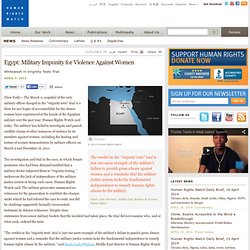
Who Cares How Many Women Are in Parliament? - By Joshua Foust and Melinda Haring. Last month The Economist published its annual infographic about the dearth of women in parliaments around the world.
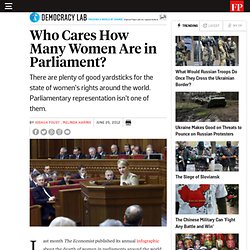
Not surprisingly, some of the most-developed countries -- Sweden, Germany, New Zealand -- top the charts. (Also present are two African countries, Rwanda and South Africa, that have mandated parliamentary quotas for women.) Equitable representation of women in politics and government is an ideal promoted by every development organization and to which every Western government aspires. Though women comprise over 50 percent of the world's population, they are underrepresented as political leaders and elected officials. The National Democratic Institute puts it plainly: "Democracy cannot truly deliver for all of its citizens if half of the population remains underrepresented in the political arena.
" There's a problem with this argument, though: There's no evidence to support it. The Eurasia region illustrates this uncomfortable reality all too well. To Be a Woman in Pakistan: Six Stories of Abuse, Shame, and Survival - Zara Jamal - International. Interviews with a handful of the country's 88 million women and girls Brides-to-be wait during a mass wedding ceremony in Karachi. Reuters. In a Baghdad E.R., Women's Psychological Wounds Go Untreated. I had been working at a trauma center in Baghdad for some time when an opportunity came up to transfer back to my old job — at a maternity hospital in Sadr City.

But I backed out at the last minute. I knew the transfer would be good for me: I’d be far away from the stress and drama of the E.R., where I had spent a lot of time. I told myself that getting away would let me process what I had seen and experienced. But I wondered if I had gotten so used to chaos that I wouldn’t function in a peaceful, stable environment. When the transfer offer came, I was responsible for this hospital’s female medical ward. Kuwait: Court Victory for Women’s Rights. (Beirut) –A court decision on April 22, 2012, cancelling a ministerial order barring women from entry-level jobs at the Justice Ministry is an important victory against legally-sanctioned discrimination in Kuwait, Human Rights Watch said today.
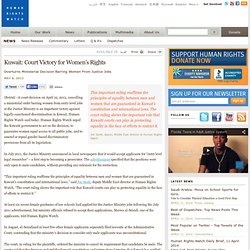
Human Rights Watch urged the Kuwaiti government to act on the decision, to guarantee women equal access to all public jobs, and to amend or repeal gender-based discriminatory provisions from all its legislation. In July 2011, the Justice Ministry announced in local newspapers that it would accept applicants for “entry level legal researcher” – a first step to becoming a prosecutor. The advertisement specified that the positions were only open to male candidates, without providing any rationale for the restriction. Status of Women in 'Reformist' Morocco. Just three years ago, a teenager from Western Sahara (which has long been occupied by Morocco) left a human rights meeting, at which point she was accosted, as she reveals in a YouTube video, by six plainclothes Moroccan policemen.
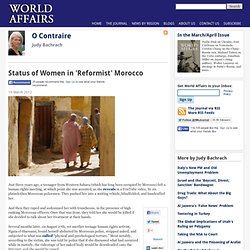
They pushed her into a waiting vehicle, blindfolded, and handcuffed her. And then they raped and sodomized her with truncheons, in the presence of high ranking Moroccan officers. Once that was done, they told her she would be killed if she decided to talk about her treatment at their hands. Several months later, on August 27th, yet another teenage human rights activist, Nguia el-Haouassi, found herself abducted by Moroccan police, stripped naked, and subjected to what was called “physical and psychological torture.” Saudi Feminism: Between Mama Amreeka and Baba Abdullah. On 9 May 2012, Manal al-Sharif was awarded the Havel Prize for Creative Dissent at the Oslo Freedom Forum in Norway.
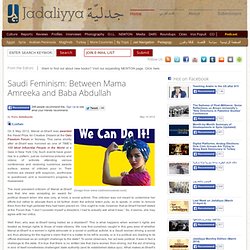
This came shortly after al-Sharif was honored as one of TIME’s 100 Most Influential People in the World at a Gala in New York City. Such events have given rise to a pattern: just as numerous pictures and videos of activists attending various conferences and receiving numerous awards surface, waves of criticism pour in. Their motives are viewed with suspicion, worthiness is questioned, and a movement’s progress is reassessed. The most prevalent criticism of Manal al-Sharif was that she was accepting an award for political dissent when she was only, at most, a social activist.
This criticism was not meant to undermine her efforts but rather to allocate them a bit further down the activist totem pole, so to speak, in order to remove them from the high pedestal they had been placed on. Well then, why was al-Sharif being hailed as a dissident? Why Afghan Women Risk Death to Write Poetry. Women, democracy and dictatorship. The electoral success of Islamic parties in Egypt, Tunisia and Morocco, has raised worries about policy and legislation on family and gender issues, this despite re-assuring noises from leading figures.
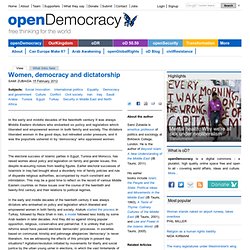
The Uprisings Will be Gendered. Women's rights and the regulation of gender and sex norms in the Arab world have long been put under the spotlight by local and international activists in addition to local and international politicians and nongovernmental organizations (NGOs). This year, the ongoing uprisings in the Arab world have brought into focus some dominant ways that sexual and bodily rights are framed, gendered, and politicized.
Young Women Demanding Justice and Dignity: By All Means Necessary. Amina Filali was a young Moroccan girl who was raped at the age of 15 then forced to marry her rapist. She was battered, bruised, and starved until she committed suicide in March 2012. She was 16 years old. Contributing to Amina’s suicide are her rapist turned husband, article 475 of the Moroccan penal code that absolves an aggressor of his crime once he consents to marrying his rape victim, the judge who called for a mediation instead of a prosecution against the offender, the police, and the religious clerics who have given their blessings to the rapist. Women, democracy and dictatorship. Women: The Libyan Rebellion's Secret Weapon. How Not to Study Gender in the Middle East.
Setbacks For Arab Women Have Outpaced Gains. A protest leader gives directions to fellow protesters as they march during a demonstration in Sanaa May 10, 2012. (photo by Reuters) Author: Barbara Slavin Posted May 15, 2012. Culture versus Rights Dualism: a myth or a reality? The 1990’s was a remarkable period in experiencing the unravelling of a world order that has characterised much of the twentieth century, and in revealing the contradictory tendencies towards and trends in the making of a new social contract between and within societies in the post cold war era.
This period witnessed a new awakening in human rights understanding as disempowered ordinary people around the world gained direct access to the international human rights system which offered a repertoire of normative standards for legitimate claim making beyond the national state. Within this context, the global women’s movement is particularly noteworthy, as it has effectively seized the emerging global opportunities in making itself heard.
Why Do They Hate Us? - By Mona Eltahawy. Between You and Me. Hatred and misogyny in the Middle East, a response to Mona el Tahawy. Politics at the Tip of the Clitoris: Why, in Fact, Do They Hate Us? What baffles me most about Mona Eltahawy’s Foreign Policy article is that it does not accomplish the task it sets out for itself; it does not, in fact, answer its foundational question: Why do they hate us? Let's Talk About Sex. This week Foreign Policy published a “Sex Issue.” They explained their decision to feature a special issue with these words. War of Position and War of Maneuver: Sexperts, Sex Pervs, and Sex Revolutionaries.